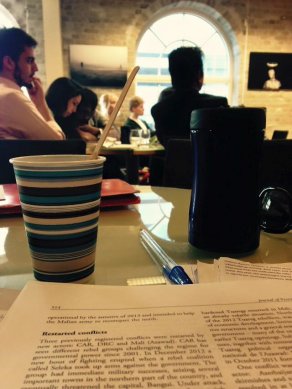This is the first of two guest blog posts by students who attended this years Peace Research course at the International Summer School 2015.
“He reminds me of my grandfather!” The liveliest girl in our class had her back to the wall and was sobbing uncontrollably while PRIO’s old, too tall and too nice head librarian Odvar Leine, unmoved by the commotion in the room, was busy explaining the procedures and collections of his compact yet focused library. The man’s husky English with a sweet Norwegian accent was the thing that not only Jessica but all of us were going to miss profoundly in the coming weeks. Almost all our classes were scheduled at University of Oslo’s (UiO) Blindern Campus and we kept yearning for Odvar and PRIO dearly as the rigor of a world-class course and the attractions of the ‘city between blue and green’ would ultimately allow us to venture only to the UiO libraries.

Coffee and Peace Research. The picture is taken during a seminar in PRIO’s Philosopher’s Hall. PHOTO: Jelena Milenkovic.
The Peace Research Institute Oslo has a ‘War Room’ too, our course coordinator Anne Duquenne had smilingly informed us while she ushered us towards the roof. Indeed, there was food for thought. The war-cry that instantly caught my eye was: “Thinking requires leisure time”, with a short note appended: “and good food”. The large group of Asians in this batch of twenty international scholars couldn’t agree more as ‘good food’ was exactly the thing they were missing the most at Blindern Dormitory; hence they were unable to do much serious thinking about war and peace.
The Cabin Trip
Researchers at PRIO seek to understand how conflicts erupt and how they can be resolved; so they decided to send us on a cabin trip as a redressal for the ‘food grievance’ and for some hands-on dialogue workshops with Ms. Norunn Grande from the celebrated Nansen Center for Peace and Dialogue. The Oslo T-bane took us to the city’s highest metro station with panoramic views of the capital and its mesmerizing fjord. Such a soaring start was bound to heighten the anticipation of a great trip and the tour actually surpassed even the best of those expectations with experiential learning, boundless fun and the choicest food. The three hour trek through Nordmarka that brought us to Studenterhytta was stunningly beautiful, the cabin owner’s welcome dinner was heavenly cooked and his wife singing the moving “Det nytter ej stort; At tage sin bog…” (“It is no use to take one’s book to the mountains…”) captured the spirit perfectly. Norunn’s impressive work in Afghanistan was not only a bright ray of hope for that war-stricken nation but was also a motivation for many of us struggling to find workable solutions to the numerous glaring challenges in our own societies.
Academics
If Norunn was an inspiration for three days, Wenche and Anne were so for the full six weeks. From stitching together an impressive mix of researchers for lectures to bringing their own knowledge and insights to discussions and from ‘Cabin Kitchen’ to ‘Peace Café’, the two ladies were beyond superlative. They managed to invite around 20 guest lecturers at the peak of holiday season. The impressive list included the current and past PRIO directors, project leaders, and senior researchers from various fields of expertise spanning global conflict zones from Haiti to Myanmar and Syria to Afghanistan.
The PRIO Director Kristian Berg Harpviken discussed peacebuilding and peacemaking in Afghanistan whereas Pavel Baev came from Washington, D.C., to shed some light on the manipulation and mismanagement of the Ukraine Crisis. Kai Egon Kverme of UiO put the Syrian Civil War into perspective and Øystein Rolandsen talked about the conflict in South Sudan. Nobuo Hayashi spoke on international humanitarian and criminal laws and former PRIO Director Stein Tønnesson explained the East Asian peace. J.Peter Burgess came all the way from Geneva to talk about the concept of human security whereas Iselin Frydenlund, just before leaving for Myanmar, spoke on the possibilities and pitfalls of using religion in peacebuilding. Halvard Buhaug revived hopes of a more peaceful future by discussing conflict trends whereas Henrik Syse not only expounded on the ‘Just War Theory’, but also helped to remove some doubts surrounding the Nobel Peace Prize Committee’s difficult work – where he is one of only five people charged with choosing the laureates. Even PRIO’s Special Advisor on publications and University of London researcher on Academic Writing Lynn Nygaard was there to help us frame our questions for group papers.
Exposure to this top quality research work has made this learning experience so enriching and mesmerizing for all of us that not even once in six weeks, we have been able to finish discussion and Q&A sessions with our distinguished lecturers within the stipulated time. Wenche has most gracefully taken the responsibility of calling time by announcing firmly, “We are already 10 minutes past and can only take two more questions”. Her presence has been as serene as her lecturing and I’m convinced she was born for peacebuilding.
My roommate and his class mates were embracing and kissing each other in euphoria at lunch today that finally the lecturing in their course was over. Meanwhile I’m just dreading what will life be like after Wenche’s last lecture tomorrow and I am sure her cookies and muffins are not going to work this time. Just hoping that she brings loads of chocolate bars to mend the heartbreaks.
Love You Wenche, Anne, and PRIO.
Good going Jahanzeb. I’m glad that you enjoyed the experience. Best wishes for your future endeavors.